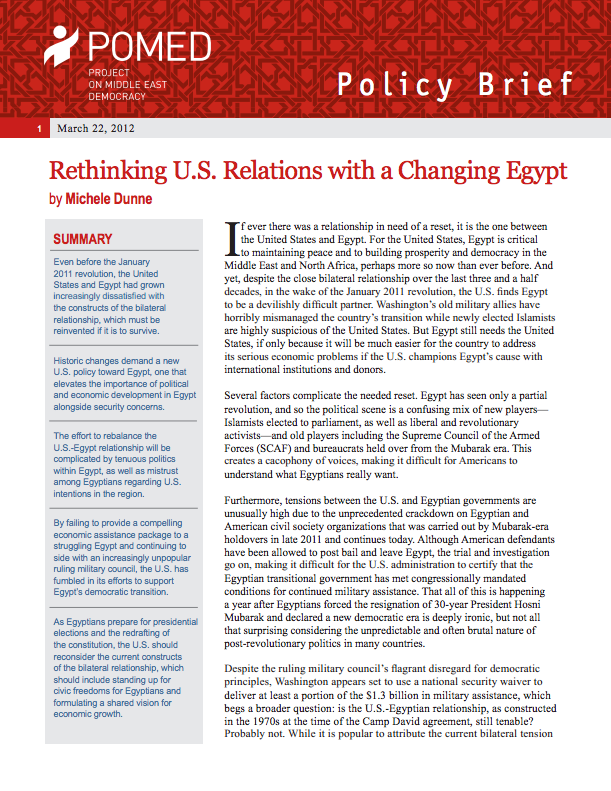For a full text copy of the brief, click here.

If ever there was a relationship in need of a reset, it is the one between the United States and Egypt. For the United States, Egypt is critical to maintaining peace and to building prosperity and democracy in the Middle East and North Africa, perhaps more so now than ever before. And yet, despite the close bilateral relationship over the last three and a half decades, in the wake of the January 2011 revolution, the U.S. finds Egypt to be a devilishly difficult partner. Washington’s old military allies have horribly mismanaged the country’s transition while newly elected Islamists are highly suspicious of the United States. But Egypt still needs the United States, if only because it will be much easier for the country to address its serious economic problems if the U.S. champions Egypt’s cause with international institutions and donors.
POLICY RECOMMENDATIONS
- Undertake a top-to-bottom policy review of the bilateral relationship and assistance package, with a view to recalibrating relations so that they truly encourage democratic development and economic growth in Egypt. Military assistance should be revisited so that it supports a continued security partnership of mutual benefit but also promotes evolving control of the military by elected civilians in a democratizing Egypt.
- Stand up for civic freedoms for Egyptians consistently. With the military likely to continue to play a political role in the future and Islamists dominating the parliament, it will be critical to Egypt’s democratic development that organizations advocating the rights and equality of all citizens are free to operate, including raising funds at home and abroad to support their work.
- Formulate a shared vision for economic growth with Egyptian interlocutors, notionally based on developing Egypt into a trade and manufacturing hub. Once there is an Egyptian government in place, the U.S. should express its willingness to move toward negotiation of a free trade agreement.
- Use U.S. leadership in the G-8 to motivate other donors—particularly Europe and Gulf States—to recalibrate their trade and assistance relations to aid Egypt’s economic growth. The U.S. should be thinking big—both in terms of scale and scope—and encouraging others to do likewise in order to incentivize sound economic policies in Egypt and stave off an economic crisis that could undermine the already perilous political process.
- Stop triangulating relations with Israel but stress the importance of Egypt playing a responsible and stabilizing regional role. While it should be clear that Egypt will only receive U.S. assistance as long as it remains at peace with Israel, efforts to continually link U.S.-Egyptian relations to Israel—for example, by offering to expand Qualifying Industrial Zones, which require a 10.5 percent Israeli component in order to enjoy duty free status with the United States, rather than a free trade agreement—create the impression that the U.S. cares about Egyptians only insomuch as they are useful to Israel, stirring deep resentment in Egypt.
- Engage a much broader Egyptian audience. U.S. officials have begun to meet with Islamist politicians, but engagement with a wide array of political actors—from the Muslim Brotherhood to Salafi groups to liberal activists—is needed to genuinely understand the changes taking place in Egypt today.



